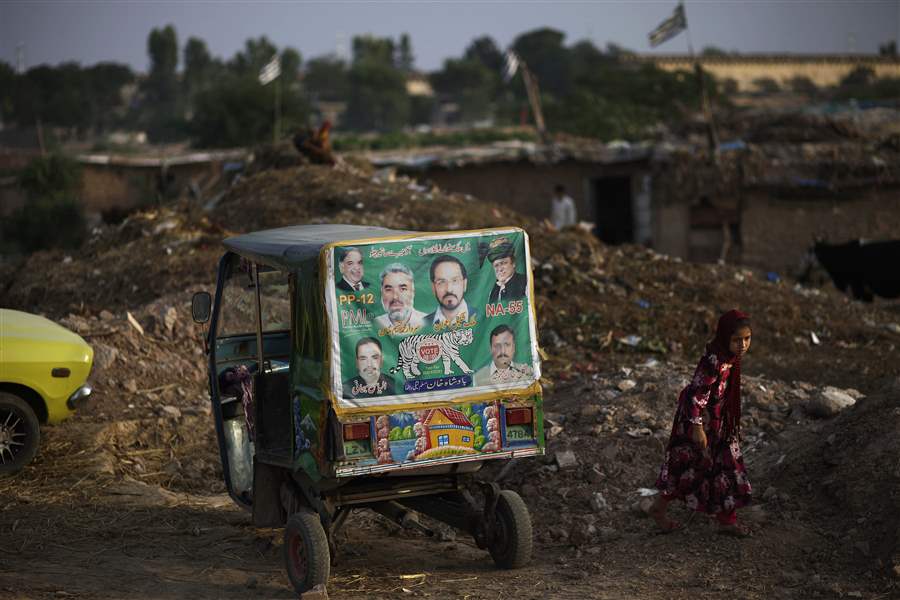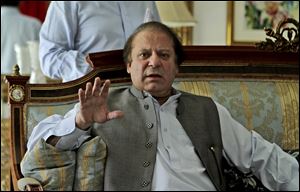
Pakistan election vote count shows big win for former Prime Minister Nawaz Sharif
5/14/2013
A Pakistani girl, right, who was displaced with her family from Pakistan's tribal areas due to fighting between militants and the army, walks past an election banner showing former prime minister and leader of Pakistan Muslim League-N, Nawaz Sharif, and other members of his party, pasted on a rickshaw parked in a poor neighborhood on the outskirts of Islamabad, Pakistan, Monday, May 13, 2013. Nawaz Shari, the Pakistani politician poised to become the country's next prime minister said Monday that Islamabad has "good relations" with the United States, but called the CIA's drone campaign in the country's tribal region a challenge to national sovereignty. (AP Photo/Muhammed Muheisen)
ASSOCIATED PRESS

Former prime minister and leader of Pakistan Muslim League-N party, Nawaz Sharif, gestures while speaking to members of the media at his residence in Lahore, Pakistan, Monday.
ISLAMABAD — The vote count from last weekend’s nationwide elections in Pakistan today indicates a big win for former Prime Minister Nawaz Sharif’s party.
Figures released by the country’s election commission, based on 254 of the 269 races where the counting has been completed, show Sharif’s Pakistan Muslim League-N party will likely get a majority in the national assembly, setting him up to be prime minister for the third time.
As the new-old premier, the 63-year-old Sharif, a devout Muslim and a populist, is expected to supplant President Asif Ali Zardari as the international face of a nuclear power whose increasing instability and Islamic militant havens are a global concern, especially at a time when the West is looking to end the war in neighboring Afghanistan.
Sharif’s party so far has won 123 of the 254 directly elected national assembly seats, the commission spokesman Khursheed Alam said. The commission is still compiling results for 15 seats, and Alam said it hopes the remaining results will be released by later today.
Earlier reports from the election commission today wrongly indicated that the count was over.
There are 272 directly-elected seats in the lower house of parliament, but races for three seats were not held because a candidate had died. A new vote will be scheduled for those seats after alternative names are proposed.
Independent candidates who normally join the party that forms the government won 25 seats. The combination would give Sharif’s party more than the 137 directly elected seats they need to have a majority.
There are an additional 70 seats for women and minorities that are apportioned to the parties based on how well they do in the general election.
The outgoing ruling Pakistan People’s Party won 31 seats. The party was battered by allegations of corruption and complaints that it did nothing to address power blackouts and inflation. Almost all of the seats that it did win were in the party’s stronghold of Sindh province.
The Pakistan Tehreek-e-Insaf party led by former cricket star Imran Khan won 26 seats, which is a huge improvement for a party that boycotted the 2008 election and only claimed one seat in the 2002 vote.
Khan’s supporters have protested the vote as unfair, and the cricket star has claimed vote-rigging in the port city of Karachi and in Punjab province. Many of the young people who have come out to vote for Khan have also taken to the streets in recent days in protests in Karachi and Islamabad calling for recounts and new elections in many areas.
But many election observers who monitored the vote have said it was relatively fair.
The Human Rights Commission of Pakistan said they did not find any evidence of systematic rigging and called on all parties to accept the vote.
The Free and Fair Election Network, a Pakistani monitoring group with thousands of observers, has described the balloting in Punjab as “relatively fair.”
“The elections were held in a free and fair manner,” said said the election commission spokesman, Alam, adding the commission was examining complaints it received.